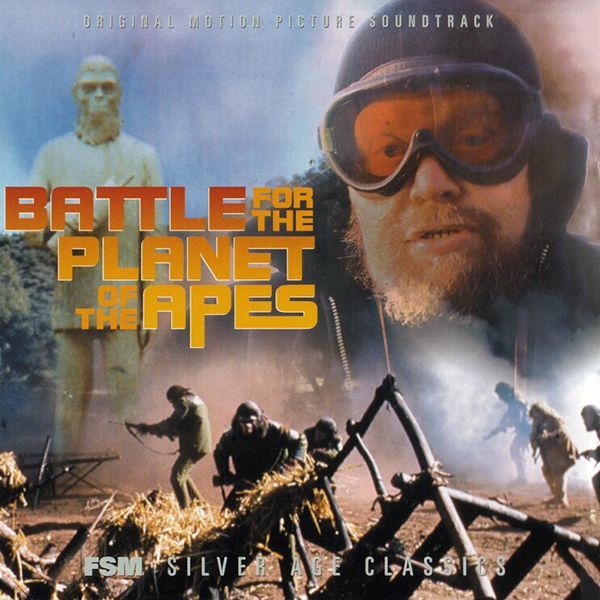Battle for the Planet of the Apes

Label: Film Score Monthly
Catalogue No: FSMCD Vol. 4, No. 1
Release Date: 2001
Total Duration: 73:43
UPN: 0638558002421
The percussive acousticality of the PLANET OF THE APES series may have never matched, musically, the originally and impact of Jerry Goldsmith’s score for the original 1968 feature. That said, though, the succeeding quartet of sequels nonetheless sustained an interesting development of the primitive nuances that Goldsmith launched. Rosenman’s score for BENEATH THE PLANET OF THE APES (released on FSM last year) took a darker and more feral edge, providing a suitable backdrop for the sequel’s mix of mutant humanity, simian malevolency, primitive awakenings, and leftover technology. Goldsmith returned for the third film, ESCAPE FROM THE PLANET OF THE APES (a 16-min OST suite appeared on Varese’s 1997 PLANET OF THE APES CD; a full score bootleg was also circulated a few years before that); echoing the film’s contemporary setting, Goldsmith’s music was more modern, instrumentally, while staying within the sparse musical conceptualization of the first film.
With FSM’s latest archival release, the cycle is brought to a satisfying close with complete soundtracks to the series’ last two films. An added bonus is Lalo Schifrin’s raging, pulsing theme from the short-lived TV series. CONQUEST was scored by jazz saxophonist Tom Scott in one of his first film scores. In the film’s booklet, Scott recalls how he consulted with Lalo Schifrin on his rushed attempt to do justice to the film score. Most of Scott’s efforts, however, were sabotaged by post-production recutting as the studio attempted to imbibe the film with more political relevancy. As a result, many cues were dropped and shuffled around and replaced with tracked-in music from the original film. The full score presented on this CD, therefore, marks the first time much of this music has ever been heard since it’s original recording.
Scott’s opening title music is quite appealing, a percussive rhythm that blends a myriad of acoustic elements with a steady riff of piano and drums – at one point even echoing Goldsmith’s pitch-blending effect from the first score. It’s a very evocative opening which is not really sustained throughout the rest of the score. Many cues, like “Ape Servitude” are fairly bland, effective perhaps in underscoring brooding visual sequences, but not too much to listen to on our home stereos. A percussive rhythm is predominant throughout, but the orchestration and diversity of the instrumentation leaves much to be desired. “Civil Disobedience” is a likable exception, with inventive use of “jungle sounds” throughout Scott’s well-stocked percussion section. “Caeser Sneaks Off” incorporates a pleasing flute melody, associated with the character. “Simian Servant School” is a clever, tongue-in-cheek motif for electric guitar over snare drums, with an occasional comic tuba thrown in. “Ape Auction” bristles with energy and restrained power, musically associating the “magnificence” of the “specimen” displayed on the slavery auction block, but the cue quickly wanders into atonality. Many of the other cues are fairly interchangeable suspense music with little appeal apart from the film. But the CONQUEST score closes with a pair of terrific long cues, “Ape Revolt Begins” (5 min.) and the very stimulating “Revolution” (7 min), neither of which were heard in their proper form in the film. Both cues are energetic, thrilling, almost improvisational. “Revolution” in particular is a bold, miasmic evocation of primal persistence. Fierce brass intonations and repetitions of the “Ape March” from the Main Title link each cue’s various interpolations and instrumental frenzy. “Revolution” alone makes the whole score – turn the volume up and let these cues rattle you into submission.
Leonard Rosenman returned to score BATTLE. Transcending the blandness of the film, his music is rich and energetic from the outset, avoiding the lackluster pitfalls of much of Scott’s score. Rosenman’s winds up the orchestra from the first cue and doesn’t relinquish control until the end. Unlike the percussion-dominated music of CONQUEST, Rosenman takes advantage of the complete orchestra, emphasizing brass and woodwinds as much as drums and keyboards, but little strings. BATTLE builds a tremendous aggression around a repeated 4-note phrase which will run throughout the film, occasionally playing off a softer family motif (“Ricky’s Theme”). “Teacher Teacher” contains some tremendous interplay between the piano and orchestra in one of the series’ best chase cues. A minor melody for woodwinds is associated with Caeser. Echoes of the Forbidden Zone from his BENEATH score are heard in “March to the Dead City,” an ominous, stark, oppresive, and bleak musical territory very befitting the Dead City. Even in its more atonal and ambient suspense material, the BATTLE score sustains interest where most of CONQUEST, until its musical climax, did not. “Mutants Move Out” features plenty of assertive brass phrasing, while “Through the Binnoculars” sustains interest through its low, ominous piano and brass beats. The climactic battle scenes are scored vigorously, with effective orchestration and a relentless forward motion.
The CD booklet is nicely analytical, including a track-by-track analysis of the music and a pleasing bit of background data on these two scores. Nicely done, providing a fitting closure to the recorded collection of APES music.
Originally published in Soundtrack Magazine
Vol.17/No.66/1998 - With
permission of the editor, Luc Van de Ven



